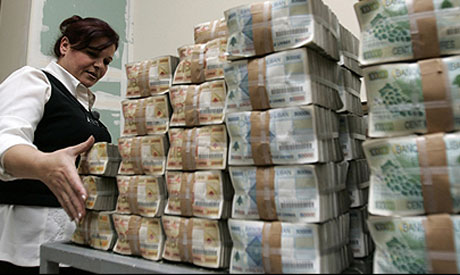This column has devoted a number of columns over the past
few years what it labeled as the dire need for Lebanon to take major active and
meaningful steps to deal with the danger that the sovereign debt posses for the
whole country. Well, I do hope that you resist the temptation to argue that
since nothing drastic has happened in that specific field then this must mean
that all the warnings can be dismissed as false alarms. That would be the
furthest thing from the truth.
There are a few reasons why Lebanon has been given a pass so
far despite its mishandling of its sovereign debt. The geopolitical strategic
position of the country in addition to its relatively small size of sovereign
debt in absolute terms plus the good sum of annual immigrant remittance and its
substantial holdings of gold stocks have combined to shelter the economy from
what would have been normal attacks given its weak sovereign debt data. It is
to be noted that a few countries that are in a stronger economic shape than
Lebanon yet they have been subjected to substantial economic pressures that
have forced them to adopt certain policies that will strengthen their financial
foreign accounts.
Please allow me to pose a question that I hope will help
illustrate the difficulties that are threatening Lebanon on the economic front.
Let us assume that the reader has an annual income of $43,000 and that the
total debt accumulated for a variety of reasons amounts to about $62,000.
Assume furthermore that the debt service averages about 7% per annum while the
revenue is not expected to rise by more than 1.5-2% per annum. As you can see
from the above a very simple calculation will show that the increase in revenue
per annum would approximate $800 while the debt service would amount to about $4300
each year. This means that this typical reader will experience an increased
debt load every year and that the debt/income ratio must climb.
At times inflation can come to the rescue of debtors that
have obtained their borrowings at a fixed long term rate. But this ‘trick’
commonly known as repression will not work in Lebanon since the Lebanese
authorities depend on constantly refinancing the accumulated sovereign debt. It
is also to be noted that even the domestic portion of the sovereign debt will
experience higher interest rates as a result of a high rate of inflation. The
rationale for that is very simple, the banks will not settle for , say 8%
interest rate if the rate of inflation is 7%. Ads the rate of domestic
inflation increases so would the interest rate paid on the domestic portion of
the debt. The same would also hole for the external debt since a high rate of
inflation would affect the rate of foreign exchange and would thus increase the
premiums demanded to insure the Lebanese debt. That in turn will translate into
higher financing burden. Even the gold
reserves cannot help rescue the economy since once sold then the heath of the
economy would weaken substantially.
The lesson from the above is that the current debt/GDP ratio
of about 144% will deteriorate each and every year even if Lebanon manages to
grow at 3-4% each year. A rough calculation would indicate that by 2020 the
debt/GDP in Lebanon would be expected to be about 175%. That would be one of
the highest rates of indebtedness in the world besides Japan whose total debt
is essentially issued in its own currency.
I am willing to stick my neck out one more time to warn that
the special circumstances that have combined thus far to prevent a severe
financial crisis in Lebanon cannot be relied upon to last forever. Actually, as
Nassim Taleb, the leading financial philosopher in the world has been preaching
for a few years: plan for and expect black swans. Many risk distributions have
thick tails and the probabilities of avoiding major breakdowns are not as large
as what used to be expected even under normal distributions. So how likely is it
for a weak distribution to avoid a major breakdown when it is built on weak
foundations? Not very likely.





No comments:
Post a Comment